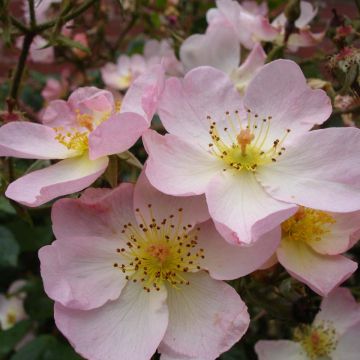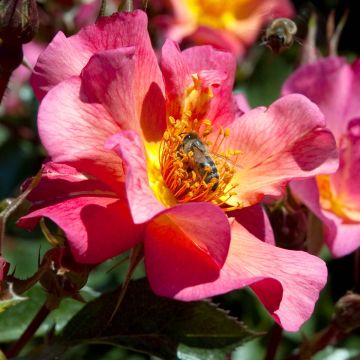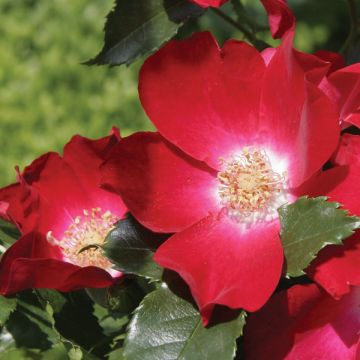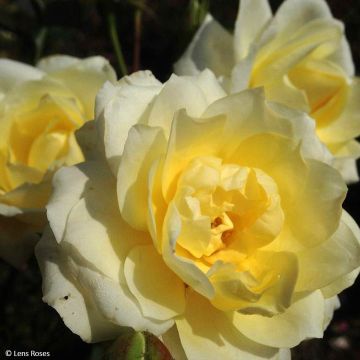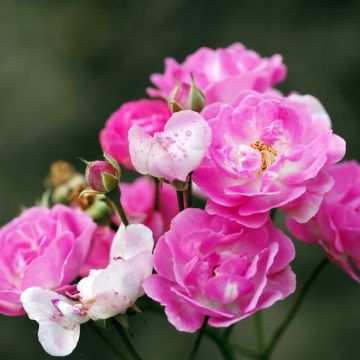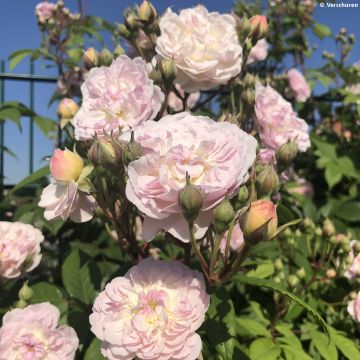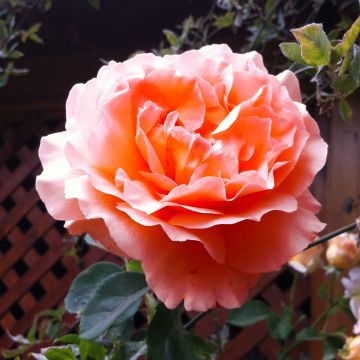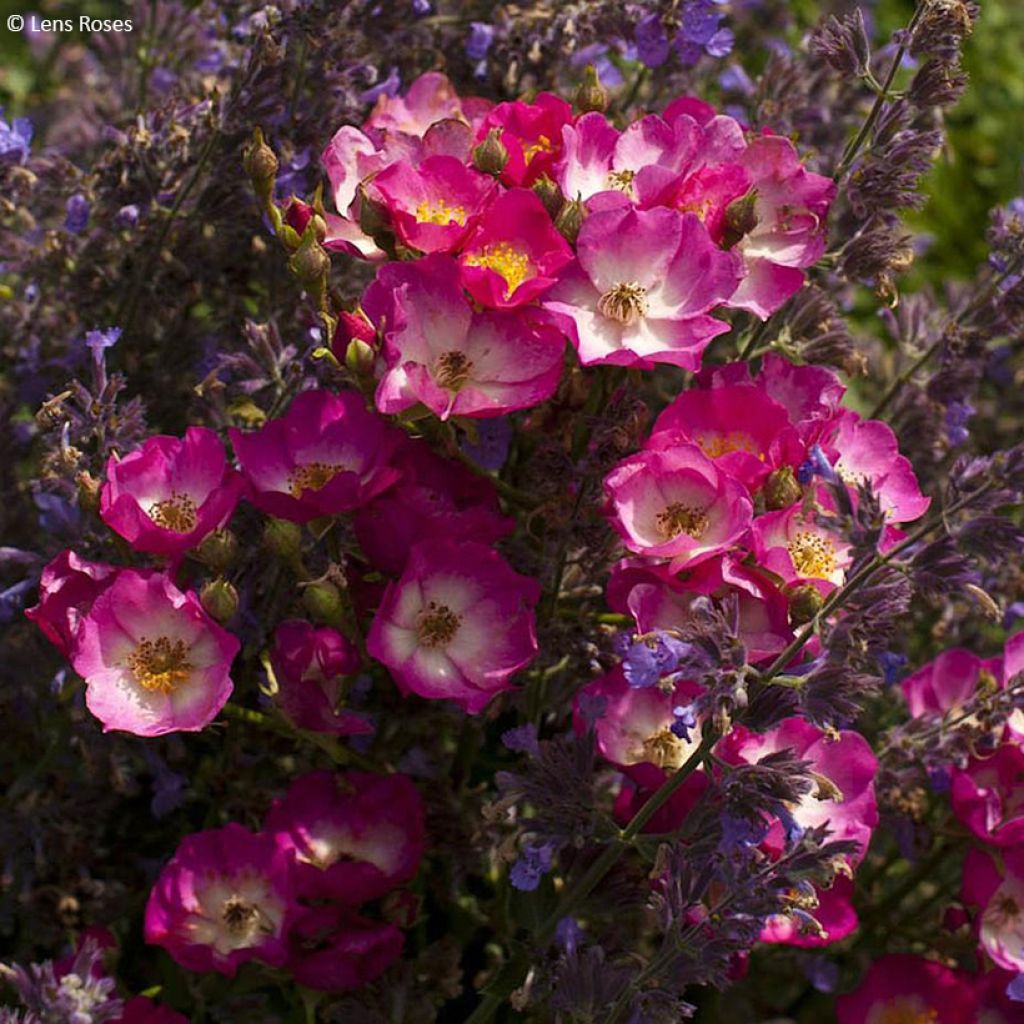

Rosa x moschata 'Schubert' - Musk Rose
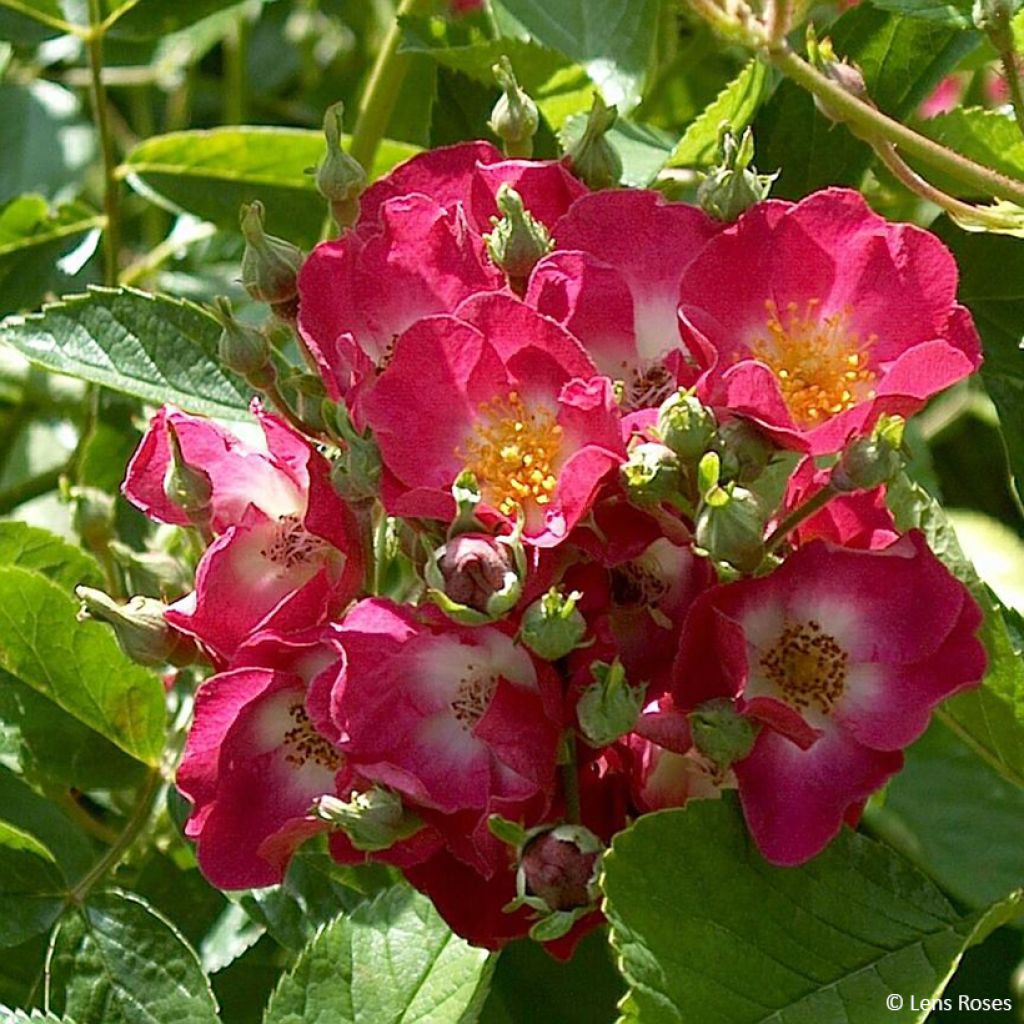

Rosa x moschata 'Schubert' - Musk Rose
Rosa x moschata 'Schubert' - Musk Rose
Rosa x moschata Schubert 'LENmor'
LENmor
This item cannot be shipped to the selected country
Delivery charge from €5.90
Delivery charge from €5.90
More information
Schedule delivery date,
and select date in basket
This plant carries a 24 months recovery warranty
More information
We guarantee the quality of our plants for a full growing cycle, and will replace at our expense any plant that fails to recover under normal climatic and planting conditions.
From €5.90 for pickup delivery and €6.90 for home delivery
Express home delivery from €8.90.
From €5.90 for pickup delivery and €6.90 for home delivery
Express home delivery from €8.90.
Does this plant fit my garden?
Set up your Plantfit profile →
Description
The 'Schubert' rose is a bush with remarkable floriferousness, whose large bouquets of small flowers in pink-red with a white centre somewhat resemble phlox panicles. This nectariferous flowering appears at the end of gracefully trailing branches. In autumn, it produces sought-after small orange-red hips that are enjoyed by birds. It is a naturally robust variety, resistant to diseases. Beautiful planted in small groups among other shrubs, this rose is useful in a low hedge. In a border, it pairs well with many perennials.
The Schubert 'LENmor' rose' is a creation of L. Lens dating back to 1984, which received the Silver Medal in Baden-Baden (Germany) in 1982. It is derived, among others, from the musk rose (Rosa (x) moschata), a spontaneous hybrid probably originating from Asia Minor or the Middle East. Similar to polyanthas and floribundas, roses in this family produce flowers gathered in bouquets, but their colours are more refined and they have a more flexible and graceful habit. 'Schubert' shows rapid growth and a bushy habit, upright at the base, spreading towards the top, fan-shaped. Ultimately, this shrub reaches an average height of 1m (3ft) with a spread of 80cm (32in). Its flexible and thorny stems bear leaves divided into small glossy leaflets, dark green, very resistant to rose diseases. Flowering begins in June and continuously repeats until October if the soil does not dry out too much and the faded flowers are regularly pruned. It takes the form of large bouquets composed of numerous small single flowers with a diameter of 3cm (1in). Their colour is almost red-pink on the periphery, surrounding a wide white centre. The centre, occupied by golden stamens, is attractive to bees and other pollinators. If the faded flowers are no longer pruned from August onwards, this rose produces decorative small fruits later in the season. Its hardiness is superior to -15°C (5°F). The deciduous foliage is absent in winter.
The Schubert rose is a quite fantastic, undemanding and particularly floriferous shrub. The shrub thrives in well-prepared soil and requires no pruning except for the removal of the oldest branches or dead wood at the end of winter. Plant it in a small flowering hedge or in a border with other landscape roses. It creates a remarkable scene with the perennial sage 'Ostfriesland' and the peony 'Sarah Bernhardt'. Also, pair it with other small flowering shrubs with staggered blooms: modest-sized lilacs (Syringa microphylla superba), mock oranges, or even Japanese quinces. Also consider pairing it with a herbaceous clematis.
Report an error about the product description
Plant habit
Flowering
Foliage
Botanical data
Rosa
x moschata
Schubert 'LENmor'
Rosaceae
LENmor
Cultivar or hybrid
Other Landscape shrub Roses
Planting and care
The 'Schubert' Rosebush can grow in both full sun and partial shade, particularly in regions that are sunny and hot. It can thrive in any garden if the soil is sufficiently rich and well-worked. When planting, prepare the soil by thoroughly breaking it up and adding an amendment such as blood, fish and bone to the bottom of the planting hole. After planting, water generously to eliminate air pockets and continue to water regularly for a few weeks to help the roots establish. Pruning is limited to removing dead wood, and you may also want to lighten the center of the bush by pruning interlacing branches. To encourage the development of other buds, remove faded flowers as they bloom.
Rose bushes may develop spots at the end of summer, but this is natural and has no adverse effect on their growth.
Planting period
Intended location
Care
This item has not been reviewed yet - be the first to leave a review about it.
Roses by producer
Haven't found what you were looking for?
Hardiness is the lowest winter temperature a plant can endure without suffering serious damage or even dying. However, hardiness is affected by location (a sheltered area, such as a patio), protection (winter cover) and soil type (hardiness is improved by well-drained soil).

Photo Sharing Terms & Conditions
In order to encourage gardeners to interact and share their experiences, Promesse de fleurs offers various media enabling content to be uploaded onto its Site - in particular via the ‘Photo sharing’ module.
The User agrees to refrain from:
- Posting any content that is illegal, prejudicial, insulting, racist, inciteful to hatred, revisionist, contrary to public decency, that infringes on privacy or on the privacy rights of third parties, in particular the publicity rights of persons and goods, intellectual property rights, or the right to privacy.
- Submitting content on behalf of a third party;
- Impersonate the identity of a third party and/or publish any personal information about a third party;
In general, the User undertakes to refrain from any unethical behaviour.
All Content (in particular text, comments, files, images, photos, videos, creative works, etc.), which may be subject to property or intellectual property rights, image or other private rights, shall remain the property of the User, subject to the limited rights granted by the terms of the licence granted by Promesse de fleurs as stated below. Users are at liberty to publish or not to publish such Content on the Site, notably via the ‘Photo Sharing’ facility, and accept that this Content shall be made public and freely accessible, notably on the Internet.
Users further acknowledge, undertake to have ,and guarantee that they hold all necessary rights and permissions to publish such material on the Site, in particular with regard to the legislation in force pertaining to any privacy, property, intellectual property, image, or contractual rights, or rights of any other nature. By publishing such Content on the Site, Users acknowledge accepting full liability as publishers of the Content within the meaning of the law, and grant Promesse de fleurs, free of charge, an inclusive, worldwide licence for the said Content for the entire duration of its publication, including all reproduction, representation, up/downloading, displaying, performing, transmission, and storage rights.
Users also grant permission for their name to be linked to the Content and accept that this link may not always be made available.
By engaging in posting material, Users consent to their Content becoming automatically accessible on the Internet, in particular on other sites and/or blogs and/or web pages of the Promesse de fleurs site, including in particular social pages and the Promesse de fleurs catalogue.
Users may secure the removal of entrusted content free of charge by issuing a simple request via our contact form.
The flowering period indicated on our website applies to countries and regions located in USDA zone 8 (France, the United Kingdom, Ireland, the Netherlands, etc.)
It will vary according to where you live:
- In zones 9 to 10 (Italy, Spain, Greece, etc.), flowering will occur about 2 to 4 weeks earlier.
- In zones 6 to 7 (Germany, Poland, Slovenia, and lower mountainous regions), flowering will be delayed by 2 to 3 weeks.
- In zone 5 (Central Europe, Scandinavia), blooming will be delayed by 3 to 5 weeks.
In temperate climates, pruning of spring-flowering shrubs (forsythia, spireas, etc.) should be done just after flowering.
Pruning of summer-flowering shrubs (Indian Lilac, Perovskia, etc.) can be done in winter or spring.
In cold regions as well as with frost-sensitive plants, avoid pruning too early when severe frosts may still occur.
The planting period indicated on our website applies to countries and regions located in USDA zone 8 (France, United Kingdom, Ireland, Netherlands).
It will vary according to where you live:
- In Mediterranean zones (Marseille, Madrid, Milan, etc.), autumn and winter are the best planting periods.
- In continental zones (Strasbourg, Munich, Vienna, etc.), delay planting by 2 to 3 weeks in spring and bring it forward by 2 to 4 weeks in autumn.
- In mountainous regions (the Alps, Pyrenees, Carpathians, etc.), it is best to plant in late spring (May-June) or late summer (August-September).
The harvesting period indicated on our website applies to countries and regions in USDA zone 8 (France, England, Ireland, the Netherlands).
In colder areas (Scandinavia, Poland, Austria...) fruit and vegetable harvests are likely to be delayed by 3-4 weeks.
In warmer areas (Italy, Spain, Greece, etc.), harvesting will probably take place earlier, depending on weather conditions.
The sowing periods indicated on our website apply to countries and regions within USDA Zone 8 (France, UK, Ireland, Netherlands).
In colder areas (Scandinavia, Poland, Austria...), delay any outdoor sowing by 3-4 weeks, or sow under glass.
In warmer climes (Italy, Spain, Greece, etc.), bring outdoor sowing forward by a few weeks.

































